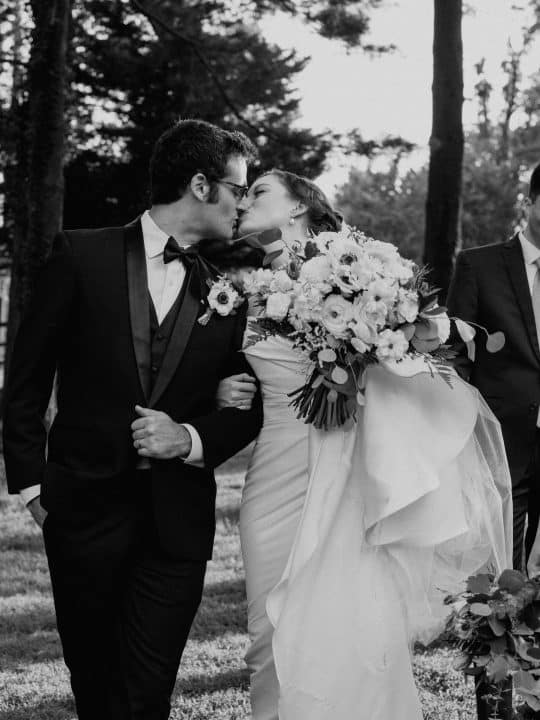
Image: Maggie Gaudean
When I was planning my wedding with Andy, there were plenty of wedding traditions that I was adamant about throwing out the window. I had no interest in wearing a veil (the history behind them wasn’t for me), I didn’t care much for rounding up our single friends onto the dance floor for a bouquet or garter toss, and the titles of Maid of Honor and Best Man, just didn’t fit our family & friend (un-even numbered) wedding party. So we cast them aside without ever looking back.
Now that I’ve been working in the wedding industry for 6+ years (how!?), there is one wedding tradition that I often find myself wondering about: taking my husband’s last name. Maybe I was young? Maybe I didn’t research the history behind why women traditionally took their husband’s last names. Maybe there just wasn’t something that personally affected or troubled me about taking Ryback and leaving Harrison aside. I don’t know why – but for some reason, I never even considered not taking Andy’s last name.
So what’s really in a name? This blog post could go a few ways, but there are two points of reflection I’d like to transition to with this post. One came from a conversation I was having recently at a work happy hour with a co-worker. A conversation that has stuck with me since we had it. The privilege some races have with the thought process behind the names they give their children and the implicit bias that arises when some people hear or read a name.
When we decided to have children, Andy and I were both on board with a family name. Personally I wanted names that could be shortened, and names that were easily pronounced. Growing up with the name “Brianne” – I was often called Brian (until the 90s, then I got Brianna). As a young girl, I got upset that I was often called a boys name (once even having a letter from a vacation rental pen pal program addressed to Mr. Brian Harrison) and so I swore I would name my kids something easy to pronounce.
What I didn’t consider in the least – was what OTHER people might think when they read the name Evelyn – something I am now learning is likely attributed to the privilege I have as a white person. My coworker shared that the names of the siblings in her family are diverse – and she asked her parents if they made those decisions specifically so that implicit bias might not play a part at their chance to be given an interview, picked for a role, etc. If you read Becky vs Aaliyah, what do YOU automatically assume and might you act differently (consciously or not) based on reading names alone.
The weight of names were recently in the spotlight at the national level on Sunday night at the Oscars. Yes, most people are still talking about the crazy mix-up of Best Picture, but one of the articles I read pointed out that Jimmy Kimmel made at least 2 jokes about Best Supporting Actor winner, Mahershala Ali. Why? Because his name isn’t super White & “American” sounding like Jimmy, it has to be the brunt of a joke? Mahershala Ali was reduced to a punchline about his name when he should have been celebrated for the historic win he just achieved. Making fun of his name was a constant reminder that Mahershala is different than the Jimmys of the world (source).
So what’s in a name? Maybe a bit more to you now after reading this post and considering these two situations that have also given me pause about what a name carries. While I still haven’t found the reason why I was so willing to take my husband’s last name, I have found greater appreciation for names in general and what they presume or maybe you implicitly assume. And what I will try and do is use this as a learning experience – for my own bias when I read a name, to a greater awareness of the full picture if I have future children to assign names to.









2 comments
Great perspective, thanks for sharing. I thought a LOT before taking my husbands name, though I ultimately did so, and also about naming my daughter. But, I did not think about the point you so wisely raised that there can be inherent bias in names. Definitely something to give me pause.
thanks for sharing Amye – the implicit bias is something I just never considered either. I think it’s why it’s so important to meet and talk with people from different walks of life (and races, religions, etc) to gain a fuller perspective.